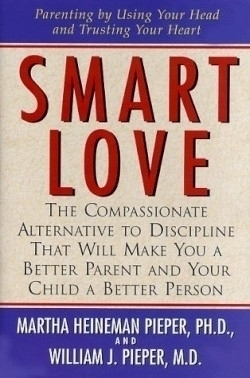
Smart Love
The Compassionate Alternative That Will Make You a Better Parent and Your Child a Better Person
One might wonder what elements make a parenting book deserving of a large publicity and advertising budget, a national radio campaign and a fourteen-city book tour. In the case of Smart Love, the elements are authors respected in academe, text that is readable and interesting and an authoritative voice. Without question, however, the element that will sell this book is controversy.
The Piepers, parents of five, advance a practice of raising well-behaved, responsible and confident children that not only ignores much of traditional and tried parenting practices, but also damns some of the current conventional methods deemed best by other experts. Indeed, the Piepers shun various (including humane) forms of punishment, disapproval, withholding of privileges and even the favorites of some educators and parents: time-outs for the young and tough love for the older intractable child.
Instead, the authors build their philosophy —what might be called “psychological optimism”—on the theory of a child’s inner happiness (Primary Happiness), a condition inborn to all children. “When your baby meets you, he is an optimist with regard to human relationships.” This inner happiness is the foundation of smart love, and to endorse and practice smart love, the reader must believe in the inner happiness theory which, unfortunately, no matter how convincingly and glowingly the Piepers write about it, they do not evidence it with proof. They suggest a lot of pro-active activity to “guide their children away from missteps without adding to their unhappiness or interfering with their development of inner happiness.” This is part of “Loving Regulation,” which replaces discipline with loving assistance and is protective of the all-important inner happiness.
Smart Love offers a multitude of vignettes from the authors? practices, some enlightening, some amusing and some rather silly, i.e. much to-do about baby who doesn’t want to leave the park, so mom chases him and races him back to his stroller. The authors call this smart love; Brazelton and Spock would simply call it distraction.
Smart Love teaches parents how to nurture from infancy to adolescence. Enlightened readers can now make the best decisions for their children.
Reviewed by
Sally Ketchum
Disclosure: This article is not an endorsement, but a review. The publisher of this book provided free copies of the book to have their book reviewed by a professional reviewer. No fee was paid by the publisher for this review. Foreword Reviews only recommends books that we love. Foreword Magazine, Inc. is disclosing this in accordance with the Federal Trade Commission’s 16 CFR, Part 255.
